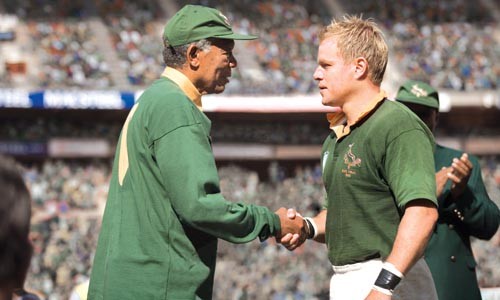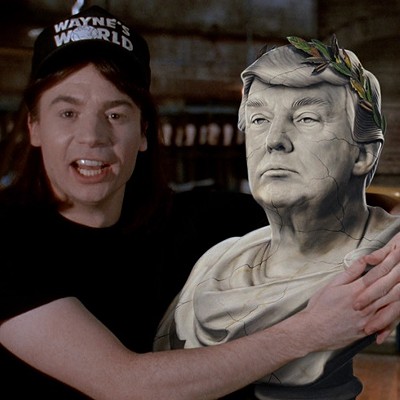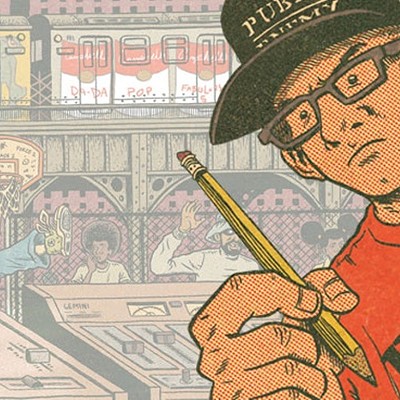Nobody has to tell Pittsburghers how embracing a sports team can bring disparate people together. But when some teams tap into ancient rivalries, nationalism or other emotional hot buttons, such fierce devotion can also be divisive.
Clint Eastwood's Invictus tells the story of South Africa's national rugby team, which transformed itself from a symbol of its country's ugly history into one of a more hopeful -- and inclusive -- future. The mass adoration of sports teams is a phenomenon that's simplistic, if valid and crowd-pleasing -- a tag that can be hung on Eastwood's movie as well.
The film opens in 1994, as recently elected President Nelson Mandela (Morgan Freeman) and his staff adjust to their new positions. There's rampant mistrust between blacks and whites, from the corridors of power to the bleak townships.
The story, adapted from John Carlin's Playing the Enemy, details Mandela's political gamble that the fractured nation could be rallied around a sports team -- even the Springboks, the rugby team indelibly linked to the ruling whites of the apartheid era. (Mandela explains that he was among the South African blacks who would automatically root for any Springbok opponent.) But in 1995, South Africa is hosting the World Cup, and the Springboks have an automatic berth, despite being a losing team and carrying unpleasant historical baggage.
Mandela sees opportunity, and thus enlists Francois Pienaar (Matt Damon), the team's Afrikaner captain. The strategy is simple: With this twin leadership and a winning team, South Africa will move out of the past, even if it simply means blacks adopting the despised team's colors, and the team reaching out to create black fans. Mandela tells his disapproving aide: "The rainbow nation starts here ... [there must be] reconciliation."
While Invictus depicts some of Mandela's other challenges, this is neither explicitly a political film nor a character study of the statesman. It's an inspirational sports drama wrapped in some admittedly historic political and cultural shifts. And as sports movies go, the Springboks' quest is familiar: Find some larger reason to become a great team -- and in a down-to-the-wire match, beat the hated rivals and bestow victory upon all countrymen.
Invictus (Latin for "unconquered") is the title of William Ernest Henley's Victorian-era poem, the words of which Mandela says helped sustain him in prison. In essence, it says that no matter what trials life delivers, "I am the master of my fate: / I am the captain of my soul." While we easily understand its impact on Mandela, it's harder to apply this maxim of individual fortitude to the lightly sketched Pienaar, or to the team or the nation. (Perhaps those more invested in sports than I can embrace this "one team, one heart, one fight" concept.)
Damon is perfectly serviceable as Pienaar, but the script doesn't give him much to work with. (Pienaar to his struggling players mid-match: "This is our destiny!") Likewise his teammates, who mostly act as a unit, and the scattering of minor characters around the edges of Mandela and Pienaar's central drama.
Eastwood's ace is Freeman, who captures Mandela's charisma, gait and (mostly) accent. The material is something of a breeze for the always-engaging Freeman, who often plays the wry, sage elder, but it takes some nerve to tackle a global living legend. (Hollywood loves bio-pic triumph with clever mimicry; Freeman should watch the mailbox for his Oscar nod.)
My chief complaint is that Eastwood doesn't trust his capable actors, or the compelling story, enough. He falls back on the rah-rah tropes and cheats that define road-to-glory bandwagon films. Mandela and Pienaar spend most of their dialogue vocalizing their motivations. (Both have the convenient gimmick of having to explain everything to skeptical teammates.) And when Pienaar visits Robben Island and sees where Mandela was imprisoned, is it necessary to superimpose a ghost image of Mandela breaking rocks? Pienaar is emotionally affected simply by seeing the empty prison; can't we be, too?
I also wish Eastwood had given more voice to the millions of angry, impoverished blacks Mandela's plan was trying to reach. The day of the big match, we see one township bar with excited blacks watching TV, but with little understanding of how they came to embrace the Springboks. (We know how Mandela's inner circle is won over -- he won't stop talking about it.)
But as Mandela himself counsels, "Forgiveness liberates the soul." So, I bow: Invictus is, at its core, a heart-swelling, sports-transcends-bad-stuff movie, and grumblers like myself are quickly sidelined. This isn't Eastwood's best film, but it's clearly a story he's emotionally invested in, and his enthusiasm is palpable. The story of Mandela and the Springboks of 1995 was a rare feel-good chapter of 20th-century South African history; it swept up millions, if only for a temporary bit of entertainment. Invictus invites viewers to share the same events, and few will be unstirred, if only for these brief movie-watching moments.















